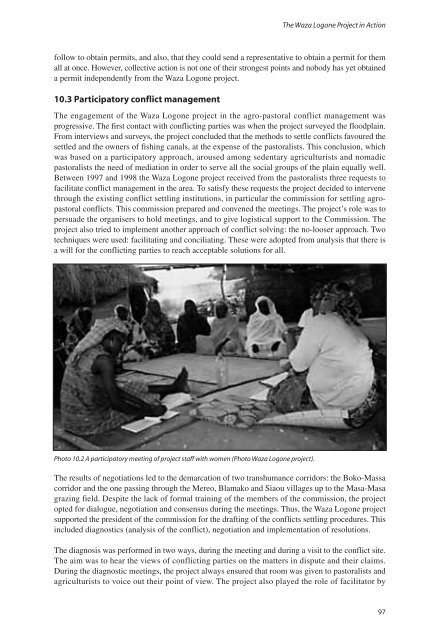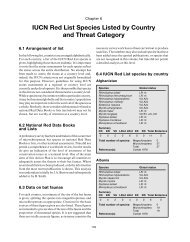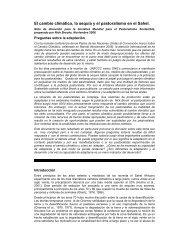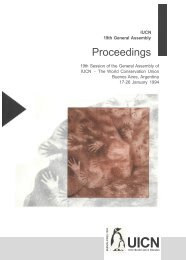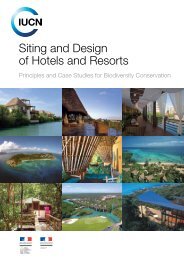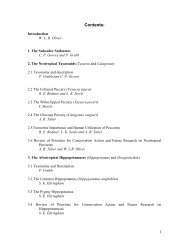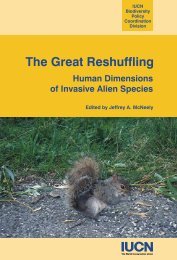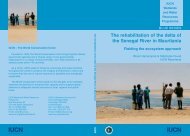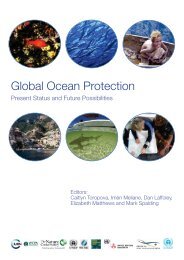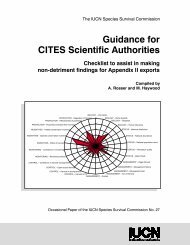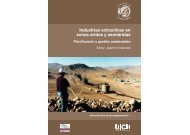The return of the water - IUCN
The return of the water - IUCN
The return of the water - IUCN
Create successful ePaper yourself
Turn your PDF publications into a flip-book with our unique Google optimized e-Paper software.
follow to obtain permits, and also, that <strong>the</strong>y could send a representative to obtain a permit for <strong>the</strong>m<br />
all at once. However, collective action is not one <strong>of</strong> <strong>the</strong>ir strongest points and nobody has yet obtained<br />
a permit independently from <strong>the</strong> Waza Logone project.<br />
10.3 Participatory conflict management<br />
<strong>The</strong> engagement <strong>of</strong> <strong>the</strong> Waza Logone project in <strong>the</strong> agro-pastoral conflict management was<br />
progressive. <strong>The</strong> first contact with conflicting parties was when <strong>the</strong> project surveyed <strong>the</strong> floodplain.<br />
From interviews and surveys, <strong>the</strong> project concluded that <strong>the</strong> methods to settle conflicts favoured <strong>the</strong><br />
settled and <strong>the</strong> owners <strong>of</strong> fishing canals, at <strong>the</strong> expense <strong>of</strong> <strong>the</strong> pastoralists. This conclusion, which<br />
was based on a participatory approach, aroused among sedentary agriculturists and nomadic<br />
pastoralists <strong>the</strong> need <strong>of</strong> mediation in order to serve all <strong>the</strong> social groups <strong>of</strong> <strong>the</strong> plain equally well.<br />
Between 1997 and 1998 <strong>the</strong> Waza Logone project received from <strong>the</strong> pastoralists three requests to<br />
facilitate conflict management in <strong>the</strong> area. To satisfy <strong>the</strong>se requests <strong>the</strong> project decided to intervene<br />
through <strong>the</strong> existing conflict settling institutions, in particular <strong>the</strong> commission for settling agropastoral<br />
conflicts. This commission prepared and convened <strong>the</strong> meetings. <strong>The</strong> project’s role was to<br />
persuade <strong>the</strong> organisers to hold meetings, and to give logistical support to <strong>the</strong> Commission. <strong>The</strong><br />
project also tried to implement ano<strong>the</strong>r approach <strong>of</strong> conflict solving: <strong>the</strong> no-looser approach. Two<br />
techniques were used: facilitating and conciliating. <strong>The</strong>se were adopted from analysis that <strong>the</strong>re is<br />
a will for <strong>the</strong> conflicting parties to reach acceptable solutions for all.<br />
Photo 10.2 A participatory meeting <strong>of</strong> project staff with women (Photo Waza Logone project).<br />
<strong>The</strong> Waza Logone Project in Action<br />
<strong>The</strong> results <strong>of</strong> negotiations led to <strong>the</strong> demarcation <strong>of</strong> two transhumance corridors: <strong>the</strong> Boko-Massa<br />
corridor and <strong>the</strong> one passing through <strong>the</strong> Mereo, Blamako and Siaou villages up to <strong>the</strong> Masa-Masa<br />
grazing field. Despite <strong>the</strong> lack <strong>of</strong> formal training <strong>of</strong> <strong>the</strong> members <strong>of</strong> <strong>the</strong> commission, <strong>the</strong> project<br />
opted for dialogue, negotiation and consensus during <strong>the</strong> meetings. Thus, <strong>the</strong> Waza Logone project<br />
supported <strong>the</strong> president <strong>of</strong> <strong>the</strong> commission for <strong>the</strong> drafting <strong>of</strong> <strong>the</strong> conflicts settling procedures. This<br />
included diagnostics (analysis <strong>of</strong> <strong>the</strong> conflict), negotiation and implementation <strong>of</strong> resolutions.<br />
<strong>The</strong> diagnosis was performed in two ways, during <strong>the</strong> meeting and during a visit to <strong>the</strong> conflict site.<br />
<strong>The</strong> aim was to hear <strong>the</strong> views <strong>of</strong> conflicting parties on <strong>the</strong> matters in dispute and <strong>the</strong>ir claims.<br />
During <strong>the</strong> diagnostic meetings, <strong>the</strong> project always ensured that room was given to pastoralists and<br />
agriculturists to voice out <strong>the</strong>ir point <strong>of</strong> view. <strong>The</strong> project also played <strong>the</strong> role <strong>of</strong> facilitator by<br />
97


